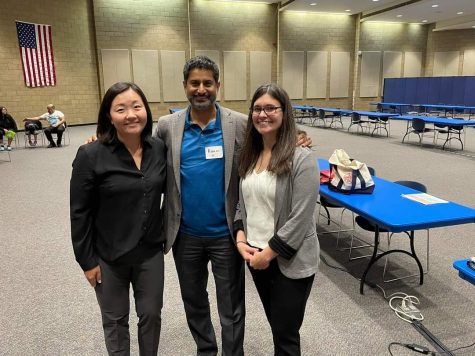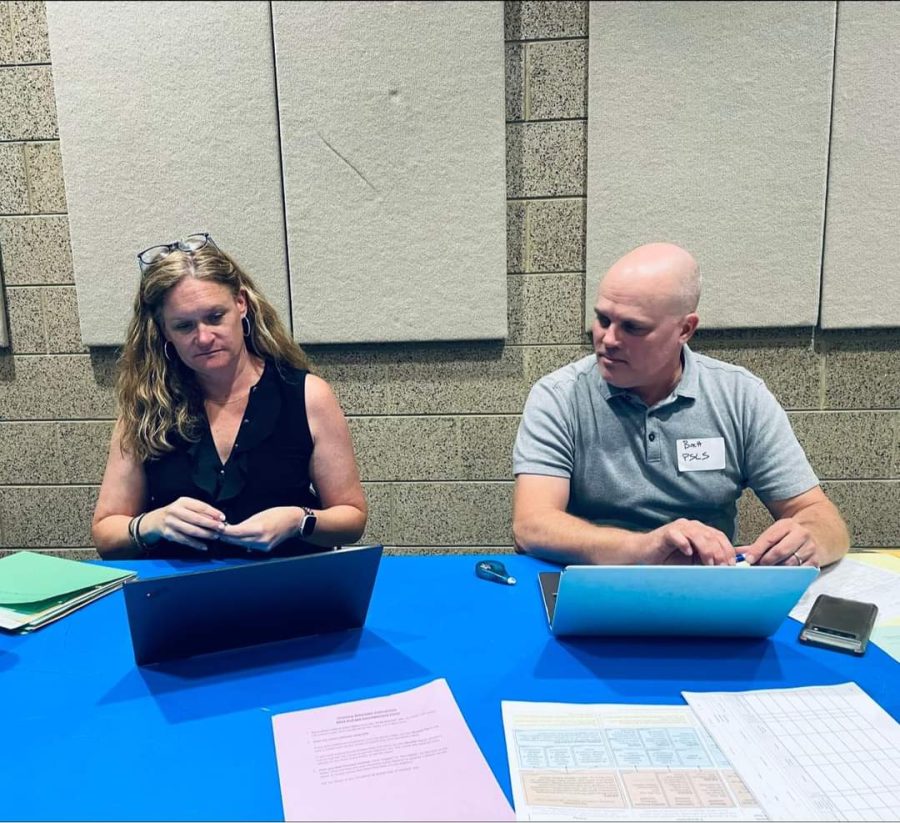DuPage Citizens Get a Second Chance at the Expungement Clinic
Community members with criminal records got a chance at a fresh start at the expungement clinic, and this can benefit all of DuPage County.
Attorneys Mia McPherson and Brett Cummins lending their expertise at the clinic. Photo provided by the Public Interest Law Initiative.
September 12, 2022
Editor’s note: This article contains an anonymous source for testimonial. This was done to protect their identity and maintain the purpose of their record being expunged. The true identity is known by both the writer and the editor.
This article contains themes about self-harm.
For six long hours on a Saturday this summer, dozens of local lawyers, COD paralegal students, and other volunteers worked to help people expunge, or erase, their records at the DuPage County Expungement Clinic. Some may wonder why all this effort is put into aiding criminals. The reality is that those who apply for expungement have not been convicted, or their conviction has been overturned.
Eligibility of an applicant depends on what type of crime it was, details of the case, when the crime happened, and current behavior of the applicant, according to Illinois Legal Aid. Expungement is usually granted for minor charges, but it can be a long process for those who don’t take the necessary legal steps. That is why so many groups came together to provide this legal service for free for community members in need.
“The existence of a criminal record, even for an arrest with no conviction, can have devastating long-term consequences,” Jessica Schneider, managing attorney at the Public Interest Law Initiative (PILI), explained.
PILI is one of the various legal aid groups who set up the clinic. Schneider described how they worked together to organize the event, recruit volunteers, advertise the event and register and screen clients.
Ted Donner, a Wheaton attorney who volunteered at the clinic, described how people can get “access to jobs, housing and other benefits that they might otherwise be unable to even contemplate. That makes [the expungement clinic] an invariably important program – both for the clients and the community.”
On the day of the clinic, clients came to the DuPage County Administration building to meet with lawyers who filed their petitions for expungement. Kimberly J. Meyers, a DeKalb attorney, described the general duties entrusted to the lawyers at the clinic.

“I provided free legal advice, document drafting and assistance to individuals… who are prevented from receiving assistance due to limited finances,” Meyers said.
The event also benefited College of DuPage paralegal students, who gained valuable knowledge, working side-by-side with the DuPage County attorneys. Christine Bautista, a COD Paralegal Studies alumni, volunteered from 9 a.m. to 3 p.m. as a runner, whose role is to guide clients through the large county building auditorium to each attorney. Many current COD paralegal students also volunteered as runners at the DuPage Expungement Clinic.
This was an opportunity for the students to apply classroom knowledge and learn from the attorneys and clients about the legal field. Though they cannot give legal advice, the students bolster the work of attorneys who give people free legal aid.
Bautista explained how “pro bono work is an important lesson to learn early in my career.” Students can volunteer at events like the expungement clinic to fulfill their ethical responsibilities and build their resume.
“Assisting clients is the most challenging part because some of them are not patient or complain about the process,” Bautista said. “We did our best to work fast enough to ensure they were able to finish their appointments.”
Donner described how many clients are understandably anxious, so the first step is to address their worry.
“Once it’s clear that no one’s being judged and that we’re all there to just deal with what amounts to some of the bureaucratic hurdles in people’s lives it gets pretty easy to connect,” he said. “Seeing the relief on people’s faces, their burdens lessening as they show a few signs of developing a good mood- it is downright energizing.”
A current college student who is going through the expungement process also shared his story. For the sake of anonymity, he is being addressed under a pseudonym. Carlyle Johansson explained how in his teen years he experienced social isolation from his friends and deterioration of his mental health. He began to carry a concealed knife which he intended to use to harm himself. He brought it on school grounds, and it was found on him.
“I was arrested and charged with possession of a deadly weapon, as well as thrown out of school,” Johansson said. He now had a juvenile criminal record but not mental help. Due to his criminal record and the harassment from peers, Johansson suffered extreme depression and self-harm.
After many years and into adulthood, he gained the strength and mental resolve to pick up his life and work to expunge his record. He did it on his own, because he couldn’t find affordable legal aid.
“I contacted over 30 lawyers from the Illinois area. The expungement process has been pretty odd. DuPage (County) still charges for it, while surrounding counties don’t. If I get this expunged, then I will be able to clear a background check,” he said.
Johansson said his motivation is to help others going through the same hardships he did.
“Seeking expungement is only the beginning,” Johansson said. “I want to repay my family for being a burden and be self-sufficient. I want to stop people from doing what I did and help them realize their value in the world. ”
Johansson is now a college student rebuilding his life. Citizens of DuPage can also aid the efforts of the expungement clinic, even if they lack a legal background. One way is to spread awareness about legal aid events, so more clients and volunteers attend.
“Often people are unaware of whether they can expunge or seal their criminal records, so spreading the information is key,” Schneider commented. Visit the PILI website to find out more about legal aid programs, and how these can benefit you or someone you know.





















Donte • Sep 13, 2022 at 11:17 am
Absolutely tremendous opportunity.